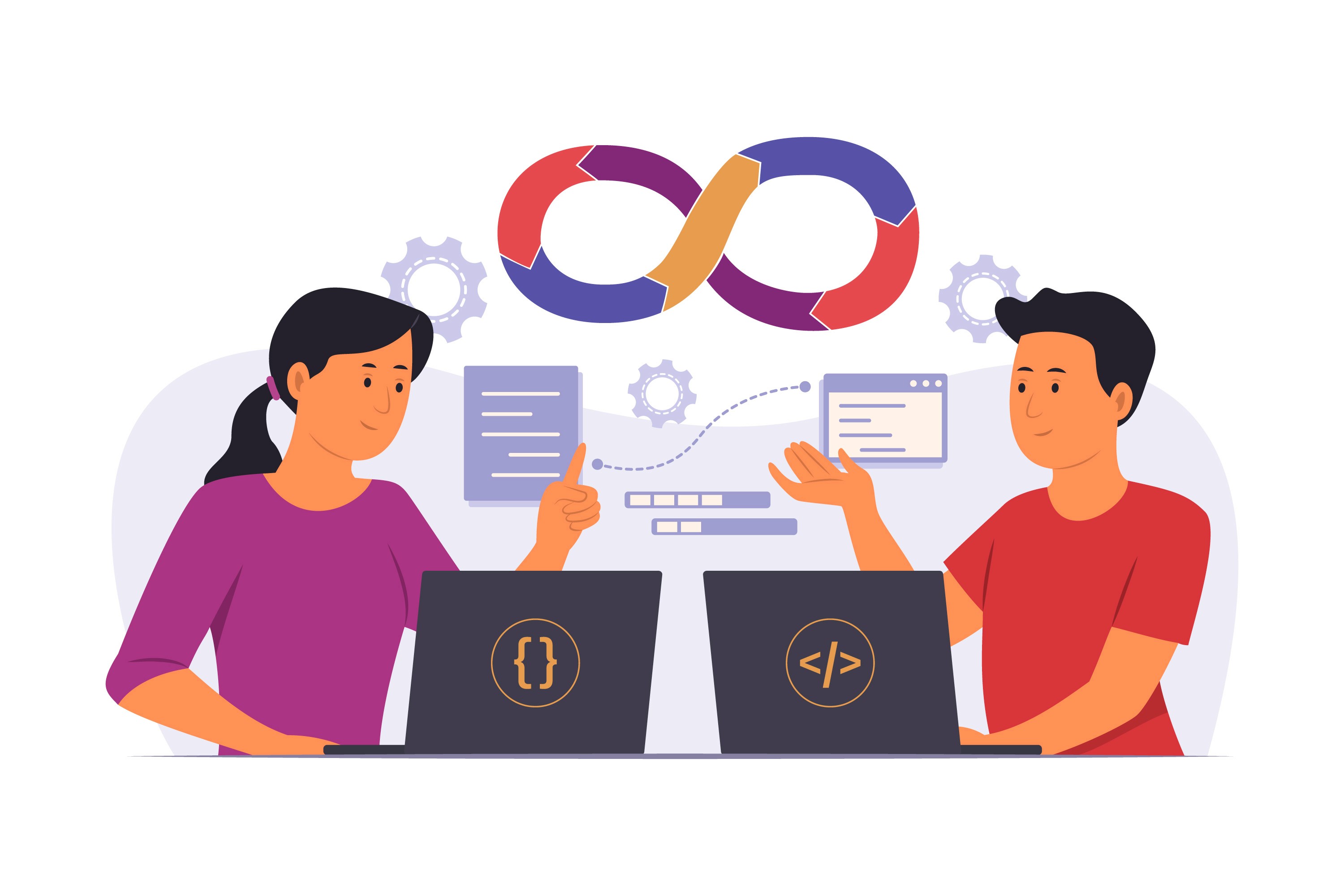Learn DevOps from Scratch: A Complete Beginner’s Guide to Becoming a DevOps Engineer
Learn DevOps from Scratch: A Complete Beginner’s Guide to Becoming a DevOps Engineer
Oct 6, 2024
Jithin
Oct 6, 2024


Jithin





Learn DevOps from Scratch: Your Ultimate Guide to Start a DevOps Career
Hey there, tech enthusiasts! Are you ready to dive into the exciting world of DevOps? You are at the right place. Whether you are a curious beginner for devops or a seasoned pro looking to switch gears, this guide will help you learn DevOps from scratch and kickstart your journey to becoming the perfect DevOps engineer. So, grab your favourite drink and let's get started!
Who is a DevOps Engineer?
Picture this: You are the bridge between two worlds, the peacekeeper in the sometimes chaotic realm of software development. That's essentially what a DevOps engineer does. They are the unsung heroes who bring together development (Dev) and operations (Ops) teams, ensuring smooth transition from code creation to deployment.
A DevOps engineer wears many hats. They are part coder, part system administrator. What is their main goal? To streamline processes, automate workflows, and make sure everyone is speaking the same language – be it Python, Java, or good old-fashioned English.
How to Become a DevOps Engineer?

Now that you know what a DevOps engineer does, you might probably wonder, "How do I become one?" Well, we are about to embark on an exciting journey. Keep reading to know more
1. Master the Basics
Before you dive into the deep end, make sure you have got a solid foundation. This means getting comfortable with:
- Linux systems (trust me, you'll be seeing a lot of command lines).
- Scripting languages like Python or Bash.
- Version control systems (Git is your new best friend).
- Basic networking concepts.
- Learn Infrastructure as Code(IaC).
- Explore Containers and Orchestration.
Don't worry if this sounds like a lot. Rome wasn't built in a day, and so is a DevOps engineer!
2. DevOps Tools You Must Learn
DevOps is all about efficiency, and there are tons of tools out there to help you achieve it. Some popular ones include:
- Git for tracking code changes.
- Jenkins for continuous integration.
- Docker for containerization.
- Kubernetes for container orchestration.
- Ansible for configuration management.
- Terraform for Infrastructure as Code.
- Nagios/Promethus for tracking system performance and troubleshooting issues.
You don't need to master all of these at once. Start with one or two and get yourself a fine hands-on experience with it.
3. Learn Cloud Platforms
Cloud computing is the backbone of modern DevOps. Familiarise yourself with at least one major cloud platform like AWS, Google Cloud, or Azure. Your future self will thank you for mastering you with the best.
4. Understand Continuous Integration/Continuous Deployment (CI/CD)
CI/CD is the heart of DevOps. It's all about automating the process of code integration, testing, and deployment. Get comfortable with creating and managing CI/CD pipelines – it's a skill that will set you apart.
5. Embrace the DevOps Culture
DevOps isn't just about tools and technologies. It's a mindset, a culture of collaboration and continuous improvement. Cultivate skills like communication, problem-solving, and adaptability. They're just as important as your technical chops!
How to Get a DevOps Job?

So, you have learned the ropes and you are ready to land in your dream DevOps job. Here's how to make it happen:
Build a Portfolio
Create your own DevOps projects. Set up a CI/CD pipeline, deploy an application on the cloud, or automate a process. Show potential employers what you can do!
Get Certified
Certifications like AWS Certified DevOps Engineer or Google Cloud Professional DevOps Engineer can give you a competitive edge.
Network
Join DevOps communities, attend meetups, and connect with professionals in the field. You never know where your next opportunity might come from!
Tailor Your Resume
Highlight your skills and projects in your resume. Don't forget to showcase your soft skills too. This will help you to stand out from the crowd!
Prepare for Interviews
Be ready to discuss your projects, troubleshoot scenarios, and explain DevOps concepts. Practice makes perfect!
How to Learn DevOps for Free?

There are plenty of free resources out there to help you on your journey without breaking your bank.
1.Online Platforms: Websites like FreeCodeCamp and DevOps Online offer free DevOps courses.
2. YouTube Tutorials: There is a wealth of knowledge on YouTube. Check out channels dedicated to DevOps and Cloud computing.
3. Documentation: Most DevOps tools have extensive, free documentation. It's a great way to learn while getting hands-on experience.
4. Open Source Projects: Contributing to open-source projects is an excellent way to learn and gain real-world experience.
5. Community Forums: Platforms like Stack Overflow and Reddit have active DevOps communities where you can learn and ask questions.
DevOps Training: Taking Your Skills to the Next Level
While free resources are great, sometimes structured training can help accelerate your learning. Many organisations offer DevOps training programs, both online and in-person. These courses often cover:
- Advanced DevOps concepts.
- Hands-on experience with popular tools.
- Real-world project scenarios.
- Preparation for DevOps certifications.
Remember, the key is to find a program that aligns with your goals and learning style. This will help you master and prepare for your DevOps career.
Steps to Kickstart Your DevOps Journey

Now that you understand the learning path and tools needed, here are practical steps you can take to break into the DevOps field.
1. Set up your Home Lab:
Use virtual machines, Docker, and Kubernetes to create and experiment with different setups in your home environment.
2. Contribute to Open source:
Join open-source projects on GitHub to gain experience and build a portfolio.
3. Practice with Real-world Projects:
Automate a task, set up a CI/CD pipeline, or manage infrastructure with Terraform in real-world scenarios.
4. Network with Professionals:
Attend DevOps meetups, webinars, or conferences to learn from professionals in the field and build your network.
5. Apply for Internships or Junior Roles:
Start with entry-level roles to get practical experience.
Take one step at a time, and before you know it, you'll be well on your way to becoming a DevOps pro!
8. Master Configuration Management Tools:
Get hands-on experience with tools like Ansible, Chef, or Puppet. These tools help automate the configuration and management of servers, ensuring consistency across environments.
10. Develop Scripting Skills:
Enhance your scripting abilities in languages like Python, Bash, or PowerShell. Automation is key in DevOps, and scripts can simplify repetitive tasks and improve efficiency.
11. Stay Updated with Industry Trends:
Follow DevOps blogs, podcasts, and forums to stay informed about the latest tools, practices, and trends in the industry. Continuous learning is essential to keep up with this rapidly evolving field.
12. Participate in Online Courses and Certifications:
Consider enrolling in online courses or certifications offered by platforms like Coursera, Udemy, or AWS Training. These structured programs can provide deeper insights and validate your skills to potential employers.
13. Build a Personal Project:
Create a personal project that incorporates various DevOps practices. It could be anything from a simple web application to a more complex system. Document the process and share it on platforms like GitHub for potential employers to see.
14. Seek Feedback and Iterate:
Engage with peers or mentors to review your work. Constructive feedback is invaluable, and learning from others can help you refine your skills and approaches.
By following these practical steps, you'll not only build a strong foundation in DevOps but also position yourself as a competitive candidate in the job market. Remember, the journey may be challenging, but persistence and dedication will lead you to success in this dynamic field.
The Future of DevOps: What's Next?
The world of DevOps is constantly evolving. As you embark on your journey, keep an eye on emerging trends like:
- DevSecOps: Integrating security into the DevOps lifecycle.
- AIOps: Using AI and machine learning to enhance DevOps processes.
- GitOps: Managing infrastructure and application configurations using Git.
- Serverless computing: Building and running applications without managing servers.
Staying ahead of these devops trends can help you become a valuable asset in any tech team.
Wrapping Up: Your DevOps Journey Starts Now
Learning DevOps from scratch might seem daunting. But remember, every expert was once a beginner. With dedication, curiosity, and a willingness to learn, you can master the art of DevOps and build an exciting career in tech.
So, are you ready to take the plunge? Start small, be consistent, and don't be afraid to make mistakes – they're often the best teachers. Before you know it, you'll be automating deployments, orchestrating containers, and speaking fluent DevOps!
So, are you ready to kickstart your DevOps career? Don't wait another day! Sign up for our DevOps Fundamentals course and take your first step towards becoming a DevOps pro with Skillect. Happy learning, and may the force of continuous integration be with you. Your future in tech begins here!
Learn DevOps from Scratch: Your Ultimate Guide to Start a DevOps Career
Hey there, tech enthusiasts! Are you ready to dive into the exciting world of DevOps? You are at the right place. Whether you are a curious beginner for devops or a seasoned pro looking to switch gears, this guide will help you learn DevOps from scratch and kickstart your journey to becoming the perfect DevOps engineer. So, grab your favourite drink and let's get started!
Who is a DevOps Engineer?
Picture this: You are the bridge between two worlds, the peacekeeper in the sometimes chaotic realm of software development. That's essentially what a DevOps engineer does. They are the unsung heroes who bring together development (Dev) and operations (Ops) teams, ensuring smooth transition from code creation to deployment.
A DevOps engineer wears many hats. They are part coder, part system administrator. What is their main goal? To streamline processes, automate workflows, and make sure everyone is speaking the same language – be it Python, Java, or good old-fashioned English.
How to Become a DevOps Engineer?

Now that you know what a DevOps engineer does, you might probably wonder, "How do I become one?" Well, we are about to embark on an exciting journey. Keep reading to know more
1. Master the Basics
Before you dive into the deep end, make sure you have got a solid foundation. This means getting comfortable with:
- Linux systems (trust me, you'll be seeing a lot of command lines).
- Scripting languages like Python or Bash.
- Version control systems (Git is your new best friend).
- Basic networking concepts.
- Learn Infrastructure as Code(IaC).
- Explore Containers and Orchestration.
Don't worry if this sounds like a lot. Rome wasn't built in a day, and so is a DevOps engineer!
2. DevOps Tools You Must Learn
DevOps is all about efficiency, and there are tons of tools out there to help you achieve it. Some popular ones include:
- Git for tracking code changes.
- Jenkins for continuous integration.
- Docker for containerization.
- Kubernetes for container orchestration.
- Ansible for configuration management.
- Terraform for Infrastructure as Code.
- Nagios/Promethus for tracking system performance and troubleshooting issues.
You don't need to master all of these at once. Start with one or two and get yourself a fine hands-on experience with it.
3. Learn Cloud Platforms
Cloud computing is the backbone of modern DevOps. Familiarise yourself with at least one major cloud platform like AWS, Google Cloud, or Azure. Your future self will thank you for mastering you with the best.
4. Understand Continuous Integration/Continuous Deployment (CI/CD)
CI/CD is the heart of DevOps. It's all about automating the process of code integration, testing, and deployment. Get comfortable with creating and managing CI/CD pipelines – it's a skill that will set you apart.
5. Embrace the DevOps Culture
DevOps isn't just about tools and technologies. It's a mindset, a culture of collaboration and continuous improvement. Cultivate skills like communication, problem-solving, and adaptability. They're just as important as your technical chops!
How to Get a DevOps Job?

So, you have learned the ropes and you are ready to land in your dream DevOps job. Here's how to make it happen:
Build a Portfolio
Create your own DevOps projects. Set up a CI/CD pipeline, deploy an application on the cloud, or automate a process. Show potential employers what you can do!
Get Certified
Certifications like AWS Certified DevOps Engineer or Google Cloud Professional DevOps Engineer can give you a competitive edge.
Network
Join DevOps communities, attend meetups, and connect with professionals in the field. You never know where your next opportunity might come from!
Tailor Your Resume
Highlight your skills and projects in your resume. Don't forget to showcase your soft skills too. This will help you to stand out from the crowd!
Prepare for Interviews
Be ready to discuss your projects, troubleshoot scenarios, and explain DevOps concepts. Practice makes perfect!
How to Learn DevOps for Free?

There are plenty of free resources out there to help you on your journey without breaking your bank.
1.Online Platforms: Websites like FreeCodeCamp and DevOps Online offer free DevOps courses.
2. YouTube Tutorials: There is a wealth of knowledge on YouTube. Check out channels dedicated to DevOps and Cloud computing.
3. Documentation: Most DevOps tools have extensive, free documentation. It's a great way to learn while getting hands-on experience.
4. Open Source Projects: Contributing to open-source projects is an excellent way to learn and gain real-world experience.
5. Community Forums: Platforms like Stack Overflow and Reddit have active DevOps communities where you can learn and ask questions.
DevOps Training: Taking Your Skills to the Next Level
While free resources are great, sometimes structured training can help accelerate your learning. Many organisations offer DevOps training programs, both online and in-person. These courses often cover:
- Advanced DevOps concepts.
- Hands-on experience with popular tools.
- Real-world project scenarios.
- Preparation for DevOps certifications.
Remember, the key is to find a program that aligns with your goals and learning style. This will help you master and prepare for your DevOps career.
Steps to Kickstart Your DevOps Journey

Now that you understand the learning path and tools needed, here are practical steps you can take to break into the DevOps field.
1. Set up your Home Lab:
Use virtual machines, Docker, and Kubernetes to create and experiment with different setups in your home environment.
2. Contribute to Open source:
Join open-source projects on GitHub to gain experience and build a portfolio.
3. Practice with Real-world Projects:
Automate a task, set up a CI/CD pipeline, or manage infrastructure with Terraform in real-world scenarios.
4. Network with Professionals:
Attend DevOps meetups, webinars, or conferences to learn from professionals in the field and build your network.
5. Apply for Internships or Junior Roles:
Start with entry-level roles to get practical experience.
Take one step at a time, and before you know it, you'll be well on your way to becoming a DevOps pro!
8. Master Configuration Management Tools:
Get hands-on experience with tools like Ansible, Chef, or Puppet. These tools help automate the configuration and management of servers, ensuring consistency across environments.
10. Develop Scripting Skills:
Enhance your scripting abilities in languages like Python, Bash, or PowerShell. Automation is key in DevOps, and scripts can simplify repetitive tasks and improve efficiency.
11. Stay Updated with Industry Trends:
Follow DevOps blogs, podcasts, and forums to stay informed about the latest tools, practices, and trends in the industry. Continuous learning is essential to keep up with this rapidly evolving field.
12. Participate in Online Courses and Certifications:
Consider enrolling in online courses or certifications offered by platforms like Coursera, Udemy, or AWS Training. These structured programs can provide deeper insights and validate your skills to potential employers.
13. Build a Personal Project:
Create a personal project that incorporates various DevOps practices. It could be anything from a simple web application to a more complex system. Document the process and share it on platforms like GitHub for potential employers to see.
14. Seek Feedback and Iterate:
Engage with peers or mentors to review your work. Constructive feedback is invaluable, and learning from others can help you refine your skills and approaches.
By following these practical steps, you'll not only build a strong foundation in DevOps but also position yourself as a competitive candidate in the job market. Remember, the journey may be challenging, but persistence and dedication will lead you to success in this dynamic field.
The Future of DevOps: What's Next?
The world of DevOps is constantly evolving. As you embark on your journey, keep an eye on emerging trends like:
- DevSecOps: Integrating security into the DevOps lifecycle.
- AIOps: Using AI and machine learning to enhance DevOps processes.
- GitOps: Managing infrastructure and application configurations using Git.
- Serverless computing: Building and running applications without managing servers.
Staying ahead of these devops trends can help you become a valuable asset in any tech team.
Wrapping Up: Your DevOps Journey Starts Now
Learning DevOps from scratch might seem daunting. But remember, every expert was once a beginner. With dedication, curiosity, and a willingness to learn, you can master the art of DevOps and build an exciting career in tech.
So, are you ready to take the plunge? Start small, be consistent, and don't be afraid to make mistakes – they're often the best teachers. Before you know it, you'll be automating deployments, orchestrating containers, and speaking fluent DevOps!
So, are you ready to kickstart your DevOps career? Don't wait another day! Sign up for our DevOps Fundamentals course and take your first step towards becoming a DevOps pro with Skillect. Happy learning, and may the force of continuous integration be with you. Your future in tech begins here!
